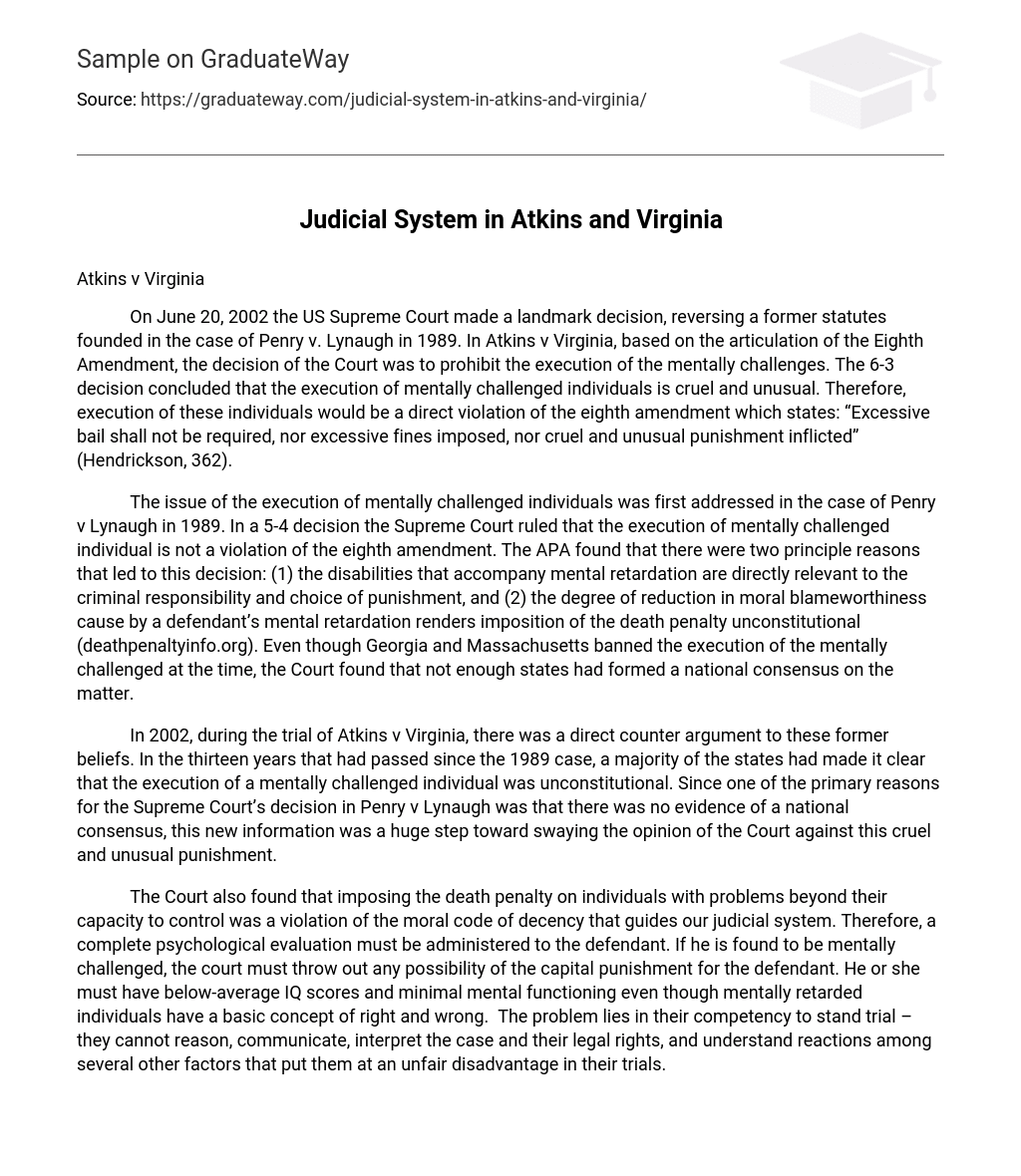Atkins v Virginia
On June 20, 2002 the US Supreme Court made a landmark decision, reversing a former statutes founded in the case of Penry v. Lynaugh in 1989. In Atkins v Virginia, based on the articulation of the Eighth Amendment, the decision of the Court was to prohibit the execution of the mentally challenges. The 6-3 decision concluded that the execution of mentally challenged individuals is cruel and unusual. Therefore, execution of these individuals would be a direct violation of the eighth amendment which states: “Excessive bail shall not be required, nor excessive fines imposed, nor cruel and unusual punishment inflicted” (Hendrickson, 362).
The issue of the execution of mentally challenged individuals was first addressed in the case of Penry v Lynaugh in 1989. In a 5-4 decision the Supreme Court ruled that the execution of mentally challenged individual is not a violation of the eighth amendment. The APA found that there were two principle reasons that led to this decision: (1) the disabilities that accompany mental retardation are directly relevant to the criminal responsibility and choice of punishment, and (2) the degree of reduction in moral blameworthiness cause by a defendant’s mental retardation renders imposition of the death penalty unconstitutional (deathpenaltyinfo.org). Even though Georgia and Massachusetts banned the execution of the mentally challenged at the time, the Court found that not enough states had formed a national consensus on the matter.
In 2002, during the trial of Atkins v Virginia, there was a direct counter argument to these former beliefs. In the thirteen years that had passed since the 1989 case, a majority of the states had made it clear that the execution of a mentally challenged individual was unconstitutional. Since one of the primary reasons for the Supreme Court’s decision in Penry v Lynaugh was that there was no evidence of a national consensus, this new information was a huge step toward swaying the opinion of the Court against this cruel and unusual punishment.
The Court also found that imposing the death penalty on individuals with problems beyond their capacity to control was a violation of the moral code of decency that guides our judicial system. Therefore, a complete psychological evaluation must be administered to the defendant. If he is found to be mentally challenged, the court must throw out any possibility of the capital punishment for the defendant. He or she must have below-average IQ scores and minimal mental functioning even though mentally retarded individuals have a basic concept of right and wrong. The problem lies in their competency to stand trial – they cannot reason, communicate, interpret the case and their legal rights, and understand reactions among several other factors that put them at an unfair disadvantage in their trials.
This is a problem that lies at the very heart of both our judicial system and the tenets upon which our country was founded. The rights of citizens often conflict, and when this happens, each case must be taken on an individual basis, evaluated on its own merits and unique details, so that a solution can be reached which is fair to everyone. Just as no two people of so-called “normal” intelligence are the same, it is equally true that no two people with a disability are the same; within this category are a wide-range of abilities and characteristics. Only by treating every case on its own merits can we ever be assure of finding a solution which protects the rights of all citizens – both the ordinary human beings and those human beings who all too often have been regarded as the ‘last and the least’ among us. By searching our hearts and our consciences on a case-by-case basis, however, we will insure equality and fairness, a goal which should stand at the forefront of all our endeavors. For it is one of the most important goals upon which our nation was founded.
Bibliography
(2002). Atkins v Virginia. Retrieved on April 22, 2007 from deathpenaltyinfo.org
Hendrickson, Dr. John. Supreme Court Decisions. New York: Pocket Books, 2003
McMillan, Robert. Landmark Decisions. New York: Simon and Schuster, 2006





